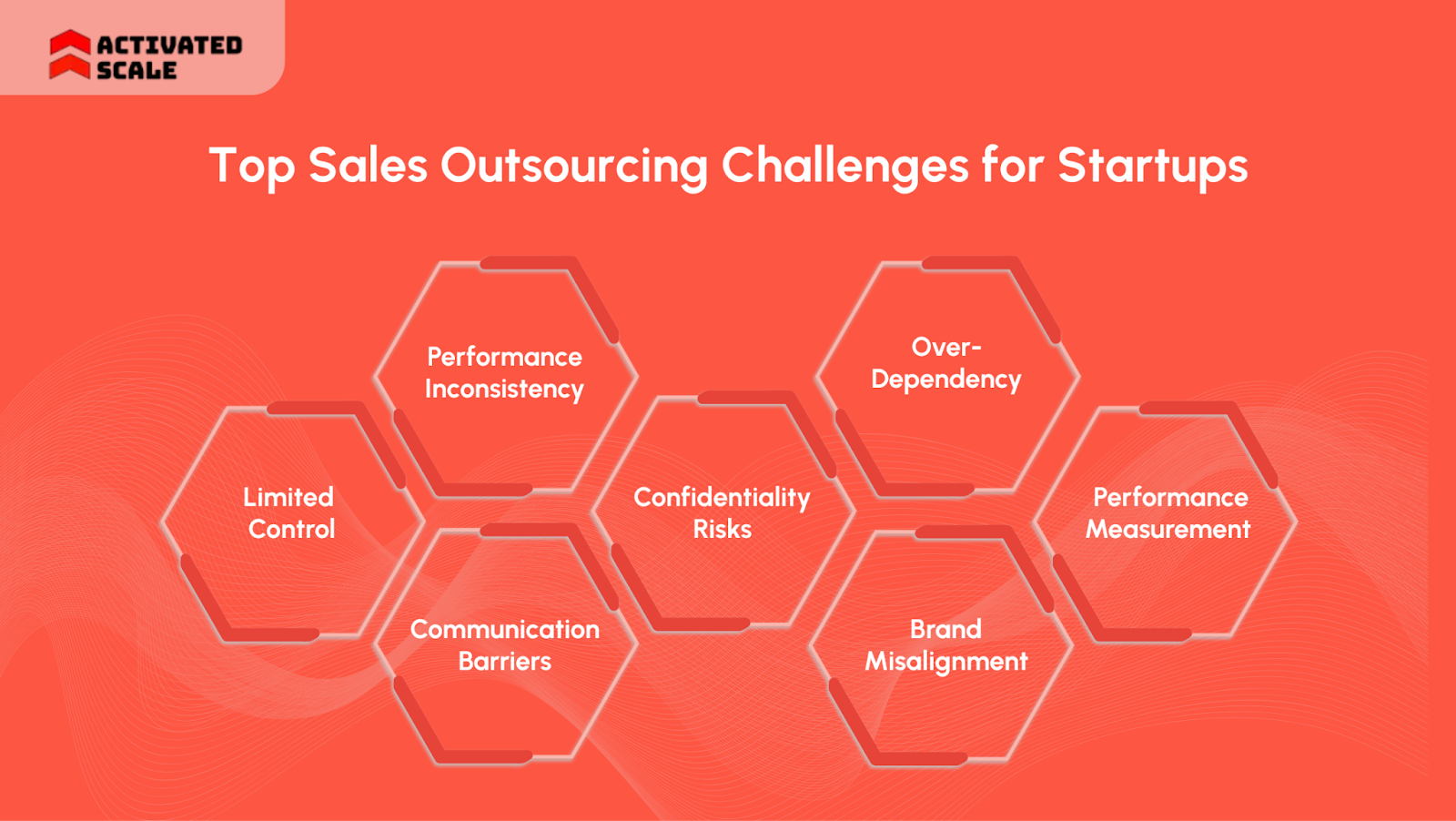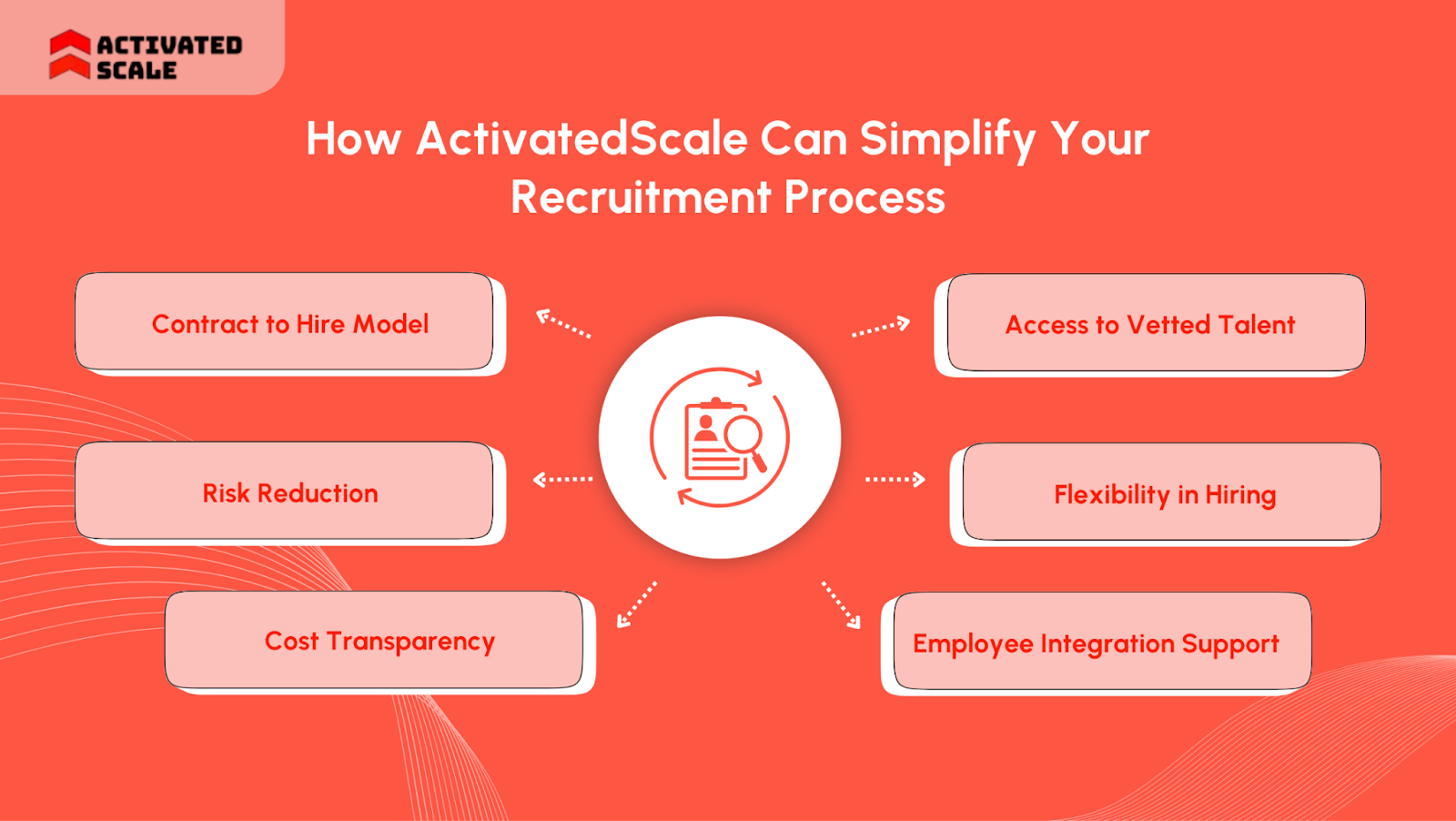Sales struggles can feel like the biggest hurdle for startups trying to find their footing, especially when every misstep in hiring or strategy can slow growth and tighten budgets. The challenge of building a strong sales team without draining resources is real and shared by many new businesses.
More startups are turning to sales outsourcing because it offers quick access to skilled sales professionals without the lengthy hiring or overhead involved in growing an internal team. This approach can help companies move faster, tap broader markets, and manage growth without spreading themselves too thin.
In this guide on Top Sales Outsourcing Challenges for Startups, key difficulties you might face will be unpacked along with practical insights.
Key Takeaways
- Limited Control Requires Clarity: Startups face reduced oversight over daily sales when outsourcing, demanding clear performance benchmarks and real-time shared CRM systems for control.
- Quality Consistency Needs Vigilance: Outsourced teams risk inconsistent sales quality without strict metrics and ongoing reviews, making quality assurance essential to protect customer relationships.
- Communication Must Overcome Barriers: Time zones, culture, and language differences create delays and misunderstandings, so startups must set clear protocols and invest in collaborative tools.
- Data Security Is Critical: Sharing sensitive customer and business data with third parties increases security risks; partnering with certified providers and strict confidentiality safeguards is crucial.
- Activated Scale Eases Hiring Risks: Activated Scale offers pre-vetted U.S.-based sales talent via contract-to-hire, helping startups reduce costly hiring mistakes and scale sales teams flexibly and quickly.
What is Sales Outsourcing?
Sales outsourcing involves hiring an external company to handle some or all of a business's sales activities, such as lead generation, customer outreach, and closing deals. It allows companies to focus resources inward while relying on other experts to drive sales results. This approach is practical for companies aiming to manage costs, access specialized skills, or scale quickly without expanding their internal teams.
In-house vs Outsourced Sales for Startups
Startups often find themselves weighing the benefits and drawbacks of in-house versus outsourced sales teams. This decision isn’t specific, as each approach impacts costs, control, and growth differently. With so many variables and options available, a clear comparison helps clarify which path better suits a startup’s unique needs and stage of development.
While in‑house teams offer control, shifting to external sales introduces hidden fragilities, trust gaps, compliance blindspots, and cultural friction that shape the Top Sales Outsourcing Challenges for Startups.
Here’s an interesting read: Understanding How Outsourcing B2B Appointment Setting Can Help Your Business
Top Sales Outsourcing Challenges for Startups

Top Sales Outsourcing Challenges for Startups look like efficiency lapses, but under pressure, they become growth bottlenecks. Spotting them early is survival, not theory, for young companies. Here’s where the cracks usually start to show:
1. Limited Control Over Sales Processes
Outsourcing sales transfers critical revenue-generating functions to external teams, significantly reducing startup founders' direct oversight over daily sales activities, customer interactions, and strategic decisions.
Key Details:
- Loss of Direct Oversight: Startup leaders cannot monitor real-time performance or intervene immediately when issues arise, potentially missing opportunities or failing to address problems quickly.
- Decision-Making Delays: External teams may require approval for strategic changes or customizations, creating bottlenecks that slow response times to market opportunities or customer needs.
- Process Misalignment: Outsourced teams might follow standardized approaches rather than adapting to your startup's unique sales methodology, potentially compromising your competitive advantage.
Solution: Establish clear performance benchmarks and implement shared CRM systems for real-time visibility while maintaining collaborative oversight through regular strategic meetings.
2. Quality Control and Performance Inconsistency
External sales teams may struggle to maintain the same quality standards as internal staff, leading to inconsistent customer experiences and potentially damaging relationships with prospects.
Key Details:
- Inconsistent Sales Techniques: Without stringent oversight, outsourced representatives might deviate from prescribed methodologies, potentially harming customer perceptions and reducing conversion rates.
- Variable Performance Standards: Different team members may deliver varying levels of service quality, creating unpredictable results that make forecasting and planning difficult.
- Monitoring Difficulties: Assessing the quality of outsourced sales interactions requires strong systems and regular audits, which many startups lack the resources to implement effectively.
Solution: Implement comprehensive quality assurance processes with clear metrics, regular performance reviews, and structured feedback loops to maintain consistent service delivery standards.
3. Communication Barriers and Cultural Misalignment
Geographic distance, time zone differences, and cultural disparities between startup teams and outsourced providers can create significant communication challenges that impair collaboration effectiveness.
Key Details:
- Time Zone Complications: Coordinating across multiple time zones creates delays in communication, slower decision-making processes, and reduced ability to address urgent issues promptly.
- Cultural Communication Styles: Different cultural approaches to feedback, conflict resolution, and professional interaction can lead to misunderstandings that impact working relationships.
- Language and Technical Barriers: Misinterpretations due to language differences or technical jargon confusion can result in incorrect execution of sales strategies.
Solution: Establish clear communication protocols with overlapping working hours, use collaborative tools such as Activated Scale for smooth information sharing, and provide cultural training sessions.
4. Data Security and Confidentiality Risks
Sharing sensitive customer information, sales strategies, and proprietary business data with external providers exposes startups to potential security breaches and intellectual property theft.
Key Details:
- Customer Data Exposure: Outsourcing involves sharing confidential customer records, payment information, and interaction histories, creating vulnerabilities for identity theft and fraud.
- Intellectual Property Risks: External teams gain access to pricing strategies, product roadmaps, and competitive advantages that could be compromised or misused.
- Compliance Violations: Third-party providers may not adhere to industry regulations like GDPR or HIPAA, exposing startups to legal penalties and reputational damage.
Solution: Partner with providers that maintain ISO27001 certifications, implement encrypted data transfer protocols, and establish comprehensive confidentiality agreements with regular security audits.
5. Brand Misalignment and Messaging Inconsistency
External sales teams often struggle to understand fully and authentically represent a startup's unique brand identity, potentially delivering inconsistent messages that confuse prospects.
Key Details:
- Brand Identity Confusion: Outsourced representatives may not grasp subtle brand nuances, leading to customer interactions that don't align with established company values.
- Inconsistent Value Proposition: Without deep product knowledge, external teams might present features incorrectly or fail to communicate unique selling points effectively.
- Customer Experience Disconnect: Prospects may receive conflicting information between marketing materials and sales conversations, eroding trust and professional credibility.
Solution: Provide comprehensive brand training with detailed guidelines, create standardized messaging templates, and conduct regular alignment sessions to maintain consistent communication.
6. Over-Dependency on External Providers
Relying heavily on outsourced sales teams creates operational vulnerabilities where provider disruptions, staff changes, or performance issues directly impact revenue generation capabilities.
Key Details:
- Operational Vulnerability: When providers experience staffing changes or operational disruptions, startups face immediate threats to their sales pipeline and revenue flow.
- Reduced Internal Capability: Over-reliance prevents the development of internal sales expertise, leaving startups without backup options when external partnerships end.
- Limited Strategic Flexibility: Dependency on external providers restricts the ability to quickly pivot sales strategies or adapt to market changes without provider coordination.
Solution: Maintain balanced internal and external sales capabilities, develop contingency plans, and gradually build internal expertise while using outsourced support.
7. Performance Measurement and ROI Challenges
Accurately measuring the effectiveness of outsourced sales efforts proves difficult for startups lacking advanced tracking systems, making ROI assessment and optimization decisions challenging.
Key Details:
- Metrics Complexity: Tracking conversion rates, sales cycle length, and lead quality across external teams requires advanced analytics tools that many startups cannot afford.
- Attribution Difficulties: Determining which leads and conversions result from outsourced efforts versus internal marketing makes accurate performance assessment nearly impossible.
- ROI Calculation Problems: Without clear metrics, startups struggle to determine if outsourcing costs justify revenue increases, hindering future investment decisions.
Solution: Implement shared tracking systems with clear attribution models, establish specific KPIs for outsourced activities, and conduct regular performance reviews.
Read more: A Guide to Contract Sales Development Outsourcing for SaaS Companies in 2025
How Activated Scale Can Simplify Your Recruitment Process

Activated Scale simplifies recruitment by connecting companies with experienced US-based sales talent on contract, enabling skill testing before full-time hiring decisions.
- Contract to Hire Model: Companies can engage Account Executives, SDRs, BDRs, or Sales Leaders initially on contract, testing skills and cultural fit before making a permanent hire.
- Risk Reduction: The contract period allows both employer and candidate to evaluate fit and performance, minimizing costly hiring mistakes common in sales roles.
- Cost Transparency: Avoids hidden expenses as costs for a bad sales hire can exceed $35,000 in just three months, including salary, benefits, tools, and training.
- Access to Vetted Talent: Activated Scale provides a curated pool of proven US-based sales professionals, saving time spent on sourcing and reducing recruitment uncertainties.
- Flexibility in Hiring: Startups and growing businesses can scale their sales team efficiently by choosing fractional or full-time hires based on current business needs.
- Employee Integration Support: The platform supports a smooth transition from contract to full employment, ensuring continuity and alignment with company culture.
In Conclusion
Sales outsourcing offers promising opportunities but comes with challenges that many startups don’t immediately anticipate. Misaligned expectations, communication gaps, and hidden expenses can quietly hinder growth if left unaddressed. Understanding these obstacles is the first step to managing them well and making sales outsourcing work in your favor.
Activated Scale simplifies sales hiring for startups by connecting you with pre-vetted US-based sales talent experienced in your market. Their flexible model allows scaling your team quickly without long waits or costly overhead. With transparent pricing, rapid onboarding, and personalized support, Activated Scale removes much of the guesswork from sales recruitment.
Book a consultation today to see how they can support your startup’s sales growth.
FAQs About Top Sales Outsourcing Challenges for Startups
- How can brand misalignment affect outsourced sales?
Outsourced sales teams may struggle to represent unique brand voices, causing inconsistent customer experiences and reduced trust during buyer interactions.
- What risks does data security pose in sales outsourcing?
Sharing sensitive customer data exposes startups to breaches or compliance issues, requiring strict security protocols and trustworthy partners to avoid costly fallout.
- How does dependency on external providers impact startups?
Overreliance on one outsourced team creates vulnerability if performance slips or partnerships end abruptly, risking sales continuity and requiring backup strategies.
- Why is communication a frequent challenge with outsourced sales?
Ineffective coordination leads to missed leads or mixed messaging; structured communication channels and regular updates help maintain alignment and responsiveness.
- What hidden costs can surprise startups in sales outsourcing?
Apart from fees, costs like onboarding, tools, and oversight of outsourced reps can add up, complicating budgeting for startups with tight financial control.
The Ultimate Guide to Hiring a Salesperson!
Get the step-by-step guide to hiring, onboarding, and ensuring success!
_edi.png)




